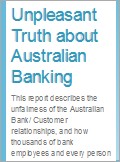FAIRNESS OF BANK/CUSTOMER RELATIONSHIPS
I carried out research for the Council of Small Businesses paper presented to the Senate Economics Committee’s Inquiry Into Banking Competition in December 2010. The Senate published the paper.
The paper draws attention to matters inhibiting competition and independence by the subscribing banks when providing services to customers based on practices set out in their contract titled the Code of Banking Practice.
The sixteen banks state the Code is a contract between banks and individual and small business customers. The problematic manner they applied the Code should concern everyone.
The research noted:
The Code allows sixteen banks to act as a cartel with practices governed by a few ambitious and possibly dishonest bankers.
This is anti-competitive as banks promote practices, including unquestioning compliance with the Code, without competing with safeguards and warranties, and other customer benefits.
The subscribing banks have engineered monitoring and review practices that protect their own interests. They act as a cartel in which their collegiate position is presented to their customers rather than regulators ensuring each subscribing bank competes with superior, transparent principles.
Lack of regulation allows the sixteen banks to limit benefits they offer customers with no bank able to destabilise or undermine the arrangement. All sixteen banks realise they must retain the status quo because the monitoring and review practices in the Code fit the needs of their most powerful and influential members.
The bank CEOs engineered this arrangement to protect each other and it is in each banks best interest to maintain it. To achieve this end, none of the banks can break-ranks. Therefore, customers can switch banks to obtain more competitive rates and packages, however securing more robust warranties are not available to customers of the sixteen major banks.
The bank/ customer agreements are set out in pro-forma offers, which include Facility Offers and General Standard Terms customers must agree to comply with; and subscribing banks state they must comply with the Code. This paper notes the banks jointly circumvented the third part of the bank/customer contract due to the bank CEOs constitution, which is an agreement with the Code Monitors.
The existence of the constitution demonstrates an anticompetitive relationship by the banks, introduced so they can retain control of complaints monitoring. This provides banks with an opportunity to conceal allegations of misconduct.
The Facility Offer and General Standard Terms protect banks, however by failing to comply with complaints monitoring practices banks have demonstrated they are able to be anticompetitive. This may well be in breach of existing legislation intended to protect the public from misleading and anticompetitive behavior.
In such circumstances, banks should never have been provided rights to self-manage compliance, with Code Monitors parties employed, paid and indemnified by the banks. By removing the Code’s safeguards, customers must address complaints and disputes in the courts. The Martin Committee’s recommendations, in 1991, and the subsequent adoption of the Code of Banking Practice, intended to make subscribing banks accountable, have alleged they make a fair bank/ customer relationship.
The author researched this paper honestly, investigating events since 1991 in order to encourage positive feedback from parties associated with banks, including the many problematic issues requiring attention by legislators, regulators, banks and customer advocates.
(Note: This paper was published on the condition it sets out views obtained from research and are identified in the complete text of the full report. It invites debate so Martin Committee’s 1991 principles are either reintroduced effectively or disbanded.) The Problematic Code Report can be found on the Senate website, headed COSBOA Sub No 90 https://www.bankinfoline.com/administrator/index.php?option=com_content&view=article&layout=edit&id=35
